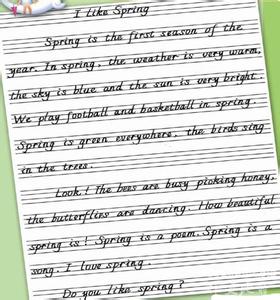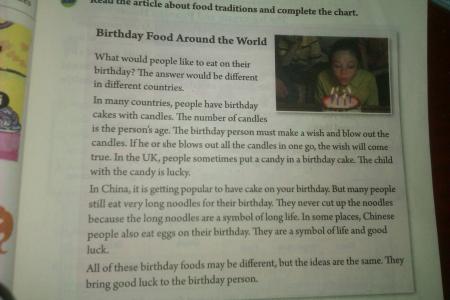英语作为一门国际通用语,在21世纪已经向着多元化、多功能化的方向发展。下面就是小编给大家整理的短小的英语文章,希望大家喜欢。
短小的英语文章:The art of living
What is it like to be old in the United States? What will our own lives be like when we are old? Americans find it difficult to think about old age until they are propelled into the midst of it by their own aging and that of relatives and friends. Aging is the neglected stepchild of the human life cycle. Though we have begun to examine the socially taboo subjects of dying and death, we have leaped over that long period of time preceding death known as old age. In truth, it is easier to manage the problems of death than the problem of living as an old person. Death is a dramatic, one-time crisis while old age is a day-by-day and year-by-year confrontation with powerful external forces, a bittersweet coming to terms with one's own personality and one's life.

Old age is neither inherently miserable nor inherently sublime-like every stage of life it has problems, joys, fears and potentials. The process of aging and eventual death must ultimately be accepted as the natural progression of the life cycle, the old completing their prescribed life spans and making way for the young. Much that is unique in old age in fact derives from the reality of aging and the imminence of death. The old must clarify and find use for what they have attained in a lifetime of learning and adapting they must conserve strength and resources where necessary and adjust creatively to those changes and losses that occur as part of the aging experience. The elderly have the potential for qualities of human reflection and observation which can only come from having lived an entire life span. There is a lifetime accumulation of personality and experience which is available to be used and enjoyed.
But what are an individual's chances for a "good" old age in America, with satisfying final years and a dignified death? Unfortunately , none too good. For many elderly Americans old age is a tragedy, a period of quiet despair, deprivation , desolation and muted rage. This can be a consequence of the kind of life a person has led in younger years and the problems in his or her relationships with others. There are also inevitable personal and physical losses to be sustained, some of which can become overwhelming and unbearable. All of this is the individual factor, the existential element. But old age is frequently a tragedy even when the early years have been fulfilling and people seemingly have everything going for them. Herein lies what I consider to be the genuine tragedy of old age in America -- we have shaped a society which is extremely harsh to live in when one is old. The tragedy of old age is not the fact that each of us must grow old and die but that the process of doing so has been made unnecessarily and at times excruciatingly painful, humiliating, debilitating and isolating through insensitivity, ignorance and poverty. The potentials for satisfactions and even triumphs in late life are real and vastly under explored. For the most part the elderly struggle to exist in an inhospitable world.
短小的英语文章:The lowest animal
Man is the only animal that robs his helpless fellow of his country-takes possession of it and drives him out of it or destroys him. Man has done this in all the ages. There is not an acre of ground on the globe that is in possession of its rightful owner, or that has not been taken away from owner after owner, cycle after cycle, by force and bloodshed.
Man is the only Slave. And he is the only animal who enslaves. He has always been a slave in one form or another, and has always held other slaves in bondage under him in one way or another. In our day he is always some man's slave for wages, and does the man's work; and this slave has other slaves under him for minor wages, and they do his work. The higher animals are the only ones who exclusively do their own work and provide their own living.
Man is the only Patriot. He sets himself apart in his own country, under his own flag, and sneers at the other nations, and keeps multitudinous uniformed assassins on hand at heavy expense to grab slices of other people's countries, and keep them from grabbing slices of his. And in the intervals between campaigns he washes the blood off his hands and works for "the universal brotherhood of man"-with his mouth.
Man is the Religious Animal. He is the only Religious Animal. He is the only animal that has the True Religion-several of them. He is the only animal that loves his neighbor as himself, and cuts his throat if his theology isn't straight. He has made a graveyard of the globe in trying his honest best to smooth his brother's path to happiness and heaven. He was at it in the time of Caesars, he was at it in Mahomet's time, he was at it in the time of the Inquisition, he was at it in France a couple of centuries, he was at it in England in Mary's day, he has been at it ever since he first saw the light, he is at it today in Crete-as per the telegrams quoted above*-he will be at it somewhere else tomorrow. The higher animals have no religion. And we are told that they are going to be left out, in the Hereafter. I wonder why? It seems questionable taste.
Man is the Reasoning Animal. Such is the claim. I think it is open to dispute. Indeed, my experiments have proven to me that he is the Unreasoning Animal. Note his history, as sketched above. It seems plain to me that whatever he is he is not a reasoning animal. His record is the fantastic record of a maniac. I consider that the strongest count against his intelligence is the fact that with that record back of him he blandly sets himself up as the head animal of the lot: whereas by his own standards he is the bottom one.
In truth, man is incurably foolish. Simple things which the other animals easily learn, he is incapable of learning. Among my experiments was this. In an hour I taught a cat and a dog to be friends. I put them in a cage. In another hour I taught them to be friends with a rabbit. In the course of two days I was able to add a fox, a goose, a squirrel and some doves. Finally a monkey. They lived together in peace; even affectionately.
短小的英语文章:Living a solitary life
The other day an acquaintance of mine, a gregarious and charming man, told me he had found himself unexpectedly alone in New York for an hour or two between appointments. He went to the Whitney and spent the "empty" time looking at things in solitary bliss. For him it proved to be a shock nearly as great as falling in love to discover that he could enjoy himself so much alone.
What had he been afraid of, I asked myself? That, suddenly alone, he would discover that he bored himself, or that there was, quite simply, no self there to meet? But having taken the plunge, he is now on the brink of adventure; he is about to be launched into his own inner space to the astronaut. His every perception will come to him with a new freshness and, for a time, seem startlingly original.
For anyone who can see things for himself with a naked eye becomes, for a moment or two, something of a genius. With another human being present vision becomes double vision, inevitably. We are busy wondering, what does my companion see or think of this, and what do I think of it? The original impact gets lost, or diffused.
"Music I heard with you was more than music." Exactly. And therefore music itself can only be heard alone. Solitude is the salt of personhood. It brings out the authentic flavor of every experience.
"Alone one is never lonely: the spirit adventures, walking in a quiet garden, in a cool house, abiding single there."
Loneliness is most acutely felt with other people, for with others,even with a lover sometimes, we suffer from our differences of taste, temperament,mood. Human intercourse often demands that we soften the edge of perception, or withdraw at the very instant of personal truth for fear of hurting, or of being inappropriately present, which is to say naked, in a social situation. Alone we can afford to be wholly whatever we are, and to feel whatever we feel absolutely. That is a great luxury!
For me the most interesting thing about a solitary life, and mine has been that for the last twenty years, is that it becomes increasingly rewarding. When I can wake up and watch the sun rise over the ocean, as I do most days, and know that I have an entire day ahead, uninterrupted, in which to write a few pages, take a walk with my dog, lie down in the afternoon for a long think (why does one think better in a horizontal position?), read and listen to music, I am flooded with happiness.
I'm lonely only when I am overtired, when I have worked too long without a break, when from the time being I feel empty and need filling up. And I am lonely sometimes when I come back home after a lecture trip, when I have seen a lot of people and talked a lot, and am full to the brim with experience that needs to be sorted out.
Then for a little while the house feels huge and empty, and I wonder where my self is hiding. It has to be recaptured slowly by watering the plants and perhaps,by looking again at each one as though it were a person.
It takes a while, as I watch the surf blowing up in fountains at the end of the field, but the moment comes when the world falls away, and the self emerges again from the deep unconscious, bringing back all I have recently experienced to be explored and slowly understood, when I can converse again with my hidden powers, and so grow, and so be renewed, till death do us part.
 爱华网
爱华网



